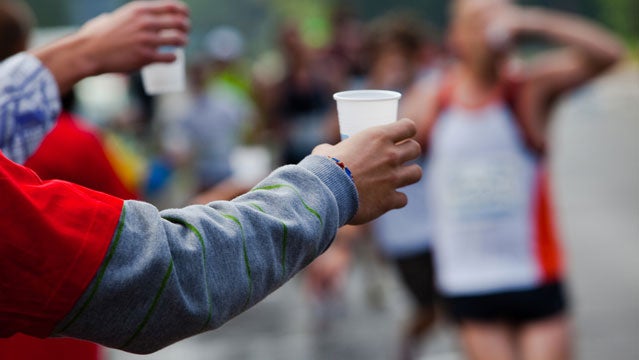What generous spectators you had!
These days, one rarely hears of endurance athletes pounding shots mid-race. However, alcohol was routinely used in competition until sometime in the 1970s to 1980s when researchers began to seriously look into its effects on sports performance. As researcher and marathoner Mel Williams wrote for Marathon and Beyond, in the early 1900s “marathon runners reportedly consumed champagne, cognac, or rum before and during competition; wine was served at the fluid replacement stations in the 1924 Paris Olympic marathon.” There are also reports that Spyridon Louis, the winner of the first modern-day Olympic marathon in 1896, downed a glass of cognac less than 10K from the finish line.
“You can trace it right back to Ancient Greece, where athletes drank alcohol during their sporting events,” says Dr. Matthew Barnes, a lecturer at Massey University’s School of Sport and Exercise in New Zealand. “It was viewed as increasing aggression. If you were more aggressive, you’d push yourself harder, and be more competitive. From that perspective, perhaps there’s something to it.”
However, there’s also the chance that whiskey won’t pull your Hulk trigger. Alcohol “might have no effect, or it might have a negative effect” on performance, Barnes says. “If you drink alcohol during or right before exercise, it has an effect on how your heart contracts—for the same relative effort, the heart has to work harder.”
But you took a shot and you felt “awesome” and you want to know why. Perhaps, Barnes speculates, it’s because the body uses alcohol as fuel, so the shot gave you a bit of a sugar rush, like taking a gel. But given the small amount of alcohol contained in a shot, Barnes thinks it wouldn’t have given you much of a boost.
So, Barnes believes, you most likely felt rad due to mental rather than physiological effects of alcohol. “You’re running a marathon and feeling pretty awful. If you take a stimulant—in small doses, alcohol is a stimulant—it’s going to give you a bit of a kick, psychologically and cognitively, which may give you some benefits at that stage in a race,” Barnes says. As a Forbes article on what alcohol does to your brain puts it: “By jacking up dopamine levels in your brain, alcohol tricks you into thinking that it’s actually making you feel great.”
Consider yourself lucky. Not everyone will have the same feel-good reaction to downing a shot toward the end of a marathon because size, gender, and history of alcohol consumption will all influence an athlete’s response to the drug.
THE BOTTOM LINE: Alcohol probably made you feel good, likely by increasing levels of the positive neurotransmitter dopamine in your brain. But researchers don’t think it did anything to help you physiologically.


